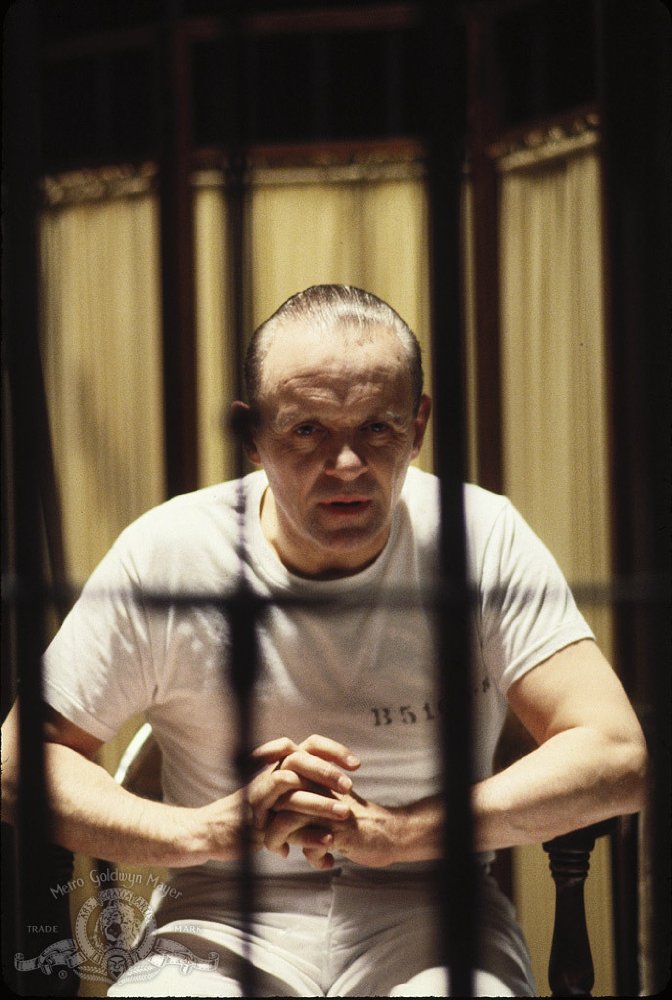It isn't often that a single name, and a fictional one no less, brings up strong imagery and instant dread. Hannibal Lecter is one of those names. His portrayal by Anthony Hopkins is sometimes considered the best in cinema history and is almost always in the discussion. Even Clarice Starling, played by Jodie Foster in another once in a lifetime performance, cannot keep up with him. The brilliance of their interactions is that Starling recognizes she cannot play head games with him that would work on lesser minds. She goes on his turf and gets what she needs to save a woman's life... even if that reveals memories that she would rather not share.
Lecter is always in charge. Just because he can't kill you (at the moment) doesn't mean he ever gives up control. He torments a fellow inmate into suicide for bad manners. He scoffs at petty punishments and isn't interested in extra perks. If he can help find another killer, he may cooperate out of amusement but certainly not out of obligation. He doesn't owe anyone anything. He's a remorseless, amoral monster
Two paragraphs in and I've only spoken primarily about one character. That's how all-encompassing he is. The strength of the two characters led to nearly unprecedented Oscar recognition - it swept all five major awards. (I would easily rank this film above the overrated It Happened One Night and the decent One Flew Over the Cuckoo's Nest.) The success of the film predictably lead to other films involving Anthony Hopkins as Lecter, which varying degrees of success. Without Foster, the chemistry just wasn't there.
We start with Clarice Starling as an FBI agent in training. She's quite determined to get the badge and we learn later that her late father was a police officer. There is a serial killer named Buffalo Bill kidnapping and eventually murdering women. Clarice's boss, Jack Crawford, suspects Hannibal Lecter (a psychiatrist by trade) could connect some of the dots but is reluctant to send an experienced agent to question him. No one will win a game of mental chess with Lecter. He sends the naive Clarice to meet with him, thinking that Lecter may be more likely to talk to someone he can manipulate.
The scene where she enters the prison area designated for the worst of the worst is terrifying all by itself. Dr. Lecter is, in fact, quite delighted to meet with the agent-in-training and greets her (behind glass, of course) with impeccable politeness. He toys with her, detecting her rural background and insulting her shoes (more than once.) He finally gives her information she can use, although not directly, and she gets an idea of how to interact with this man. He does know enough to help and may provide it under the right circumstance. Quid pro quo. When a senator's daughter goes missing, there are enough clues to suggest Buffalo Bill is responsible. The meetings between Starling and Lecter intensify. He is always playing games, as he doesn't really care if the killer is caught.
Suppose I should talk about the actual killer at some point. Buffalo Bill is played by Ted Levine, a fine performance overshadowed by the two leads. He is unstable and strangely effeminate. He has devised a dungeon in his basement to keep his victims alive for some reason. He exploits his victim's kindness to catch her, but then refers to her as "it" after capture. In any other film, his character would be absolutely terrifying. In this one, he's kind of an afterthought.
This is a psychological horror film in every sense of the word. There is blood, but most of the horrific acts are simply described, not shown. There are no comical interludes to break the tension. Time is running out and only a psychopath can save the day. Safe to say, this is not the scenario that the FBI expects. I could imagine the skepticism the producers had to make a character-driven horror movie and find an audience. Thankfully, someone took that risk.
